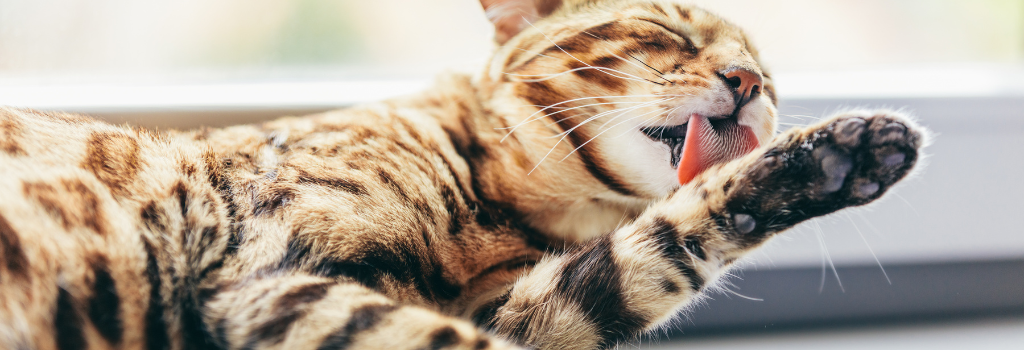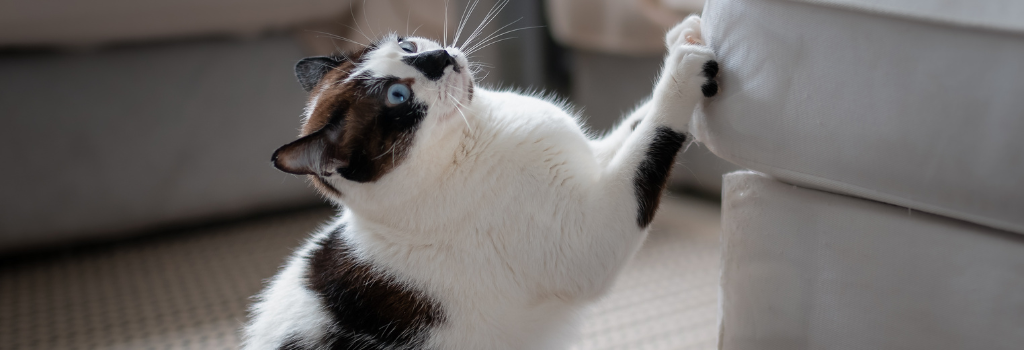Have you ever heard someone say “dogs have masters, cats have staff”? There is some truth behind it. Although both are adorable, furry pets who coexist with us, it’s important to remember that cats are not dogs. Habits, behaviors, and what’s considered “normal” varies greatly between these two species.
Similar to humans, stress can weaken a cat's immune system, making them vulnerable to serious health problems. Instinctually, cats are inclined to hide signs of illness to avoid appearing weak to potential predators. That's why how to interpret your cat's body langauage and identify subtle signs of discomfort. A happy cat is a healthy cat!
We're shining a light on four behaviors that might seem innocuous at first glance but could be indicative of underlying issues in your feline friend. From over-grooming and persistent talking or meowing to unusual scratching and vomiting, we'll delve into what these behaviors might mean and when it's time to consult your veterinarian. Understanding these signs is key to ensuring the health and happiness of your cherished cat. Let's explore these feline behaviors together, deciphering what our whiskered companions are trying to communicate through their unique language.

Here are four behaviors that may trigger concern as a pet owner.
Over-grooming
Cats are known for their impeccable grooming habits, and it's not unusual to see them licking themselves for hours on end. However, if your cat starts to excessively groom to the point of causing bald spots or raw skin, it could be a sign of a bigger problem. Excessive grooming can be a behavioral response to stress, allergies, skin issues, or even pain, and can lead to serious health issues if left untreated. Keep an eye out for hair loss, redness, sores, or signs of parasites, such as fleas. It's important to monitor your cat's grooming habits and take them to the vet if you notice any excessive or abnormal behavior.
Crying, Meowing, and Yowling
While it's common for cats to vocalize to communicate with their owners, excessive and persistent meowing can be a sign of distress or a potential health issue. Pay attention to the tone of your cat. If a cat's meowing sounds different than usual, they may be expressing pain, fear, nausea, or confusion related to aging (yes, our senior cat friends can develop dementia-like symptoms!). Listen closely; your cat might be trying to tell you a check-up is in order!
Unusual scratching
Scratching is a totally normal and natural behavior. Cats scratch for a variety of reasons, such as to exercise their hunting muscles, keep their claws groomed, and to mark territory. All cats want to feel secure in their homes, and scratching releases pheromones in their paws that helps them feel reassured that the area is safe. However, as we all know, it can become a problem if they start scratching furniture or other inappropriate items in the house. This behavior could indicate a need for a new scratching post or other environmental enrichment, or it could be a sign of stress or anxiety. It's important to address this behavior early on to ensure your cat's well-being, and to prevent further damage to your furniture!

Vomiting more than once or twice a month
If you just read the above bullet point, and thought, “but, my cat throws up all the time!”, you might be surprised to hear that its actually not normal for cats to vomit frequently. Cats may vomit a hairball every now and then, but vomiting consistently can be a sign of a more serious digestive issue. In such cases, it's important to seek veterinary care to identify the underlying cause of the problem before it’s too progressed. Pay attention to the consistency of the vomit, as this can provide important clues about the cause of the problem. For instance, foamy white vomit may indicate renal disease, which requires prompt treatment to prevent further complications.
The Tail End
Being attuned to your cat's behaviors and body language is crucial in maintaining their health and well-being. Regular visits to a veterinarian can help catch potential problems early and prevent them from becoming more serious. By understanding and addressing your cat's unique needs, you can ensure a happy and healthy life for your feline companion.
No, cats are not small dogs. However, even though they are independent creatures, but they still need love, attention, and care just like any other pet!
If you have questions and you'd like to reach out to us, you can call us directly at (818) 248-3963, or you can email us at [email protected]. Don't forget to follow us on social media Facebook, Instagram.
This blog was first seen on Cat Care Center of Baton Rouge.
